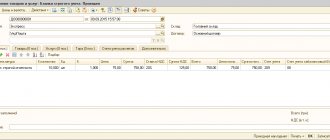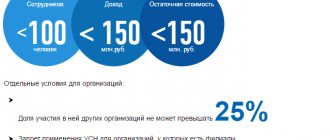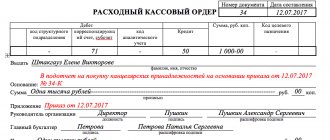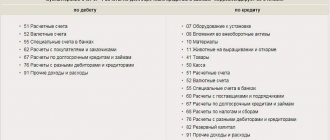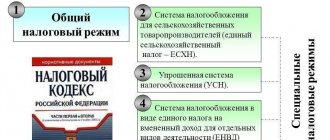The taxpayer's performance of transactions exempt from VAT attracts the close attention of inspectors. Of course, the budget “does not receive” a certain amount in the form of unassessed tax, and besides, there is the possibility of abuse of the right to deduction by the taxpayer...
Hence the desire of tax officials to check the legality of the use of this preference by an economic entity, and to monitor the correctness of its separate accounting.
Inspectors also pay close attention to transactions involving the provision of cash loans by taxpayers to their counterparties. But due to the specifics of this operation, the established and proven control system sometimes fails. We will explain how this manifests itself in this article using fresh examples from arbitration practice.
Interest under Article 317.1 of the Civil Code of the Russian Federation: as it was before
This article stipulates the procedure for collecting interest on the use of funds and applies to commercial organizations. Its old version implied the accrual of interest by default. Let us explain using the example of an agreement between the buyer and seller of a product. If it did not indicate that the provisions of Article 317.1 of the Civil Code of the Russian Federation do not apply to the legal relations between the parties to the transaction, then interest for the use of funds in the event of late payment should have been accrued automatically. In other words, if the buyer paid for the goods in violation of the deadline established by the contract, then for the period of delay, interest was accrued on the amount of debt based on the refinancing rate of the Central Bank (from January 1, 2021, the refinancing rate is equal to the key interest rate). The seller of the goods had the right either to collect accrued interest or not to do so, that is, to forgive them to the buyer.
Reference
Interest for the use of funds in this case is accrued only on agreements concluded after July 1, 2015, that is, from the moment this rule comes into force. Since legal interest is not a penalty, it can be accrued simultaneously with interest for the use of someone else’s money in accordance with Article 395 of the Civil Code of the Russian Federation. All this follows from the resolution of the Plenum of the Supreme Court of the Russian Federation dated March 24, 2016 No. 7.
Tax consequences
If the parties indicated in the agreement that the provisions of Article 317.1 of the Civil Code of the Russian Federation do not apply to legal relations between them, then this did not entail any tax consequences. If the contract did not contain conditions for refusal to apply this article, then, as stated above, interest was accrued by default, and the seller and buyer respectively incurred income and expenses in connection with the accrual of this interest. At the same time, according to the Ministry of Finance, the parties incurred these incomes and expenses by default. That is, in the absence of a provision in the contract on the non-application of Article 317.1 of the Civil Code of the Russian Federation, the seller had to accrue non-operating income (the buyer - non-operating expenses) on the last day of each month until the buyer paid the specified interest.
If the creditor refused to collect interest on debt obligations, then the buyer wrote them off as non-operating income. The seller could not write off this amount as non-operating expenses, because debt forgiveness is a gratuitous transaction, and expenses for them are not taken into account.
Conclusion
So, if the seller did not intend to collect interest from the buyer in accordance with Article 317.1 of the Civil Code of the Russian Federation, then before August 1, 2016 this should have been stated in the contract. Otherwise, the tax service would have a question as to why the seller did not take into account the amounts of interest accrued in accordance with this article as part of his non-operating income.
On the submission of documents confirming the right to apply for an exemption
So, an organization that is not a credit organization is not deprived of the right to provide loans to both its employees and third-party organizations. If the loan is issued (we are, of course, not talking about employees) in cash or securities, this operation is recognized as non-taxable (exempt from taxation) VAT on the basis of paragraphs. 15 clause 3 art. 149 Tax Code of the Russian Federation .
Transactions exempt from VAT are not taken into account when determining the tax base. However, the taxpayer is obliged to notify the tax authorities about their implementation by submitting a declaration - this is necessary to control the correctness and completeness of the calculation of tax amounts.
And now, seeing that in Sect. 7 of the VAT return reflects certain amounts; controllers require documents from the taxpayer confirming the legality of indicating the named amounts in this section.
Well, it seems logical and even reasonable: pp. 6 clause 1 art. 23 of the Tax Code of the Russian Federation establishes the obligation of taxpayers to submit to the tax authorities and their officials, in cases and in the manner prescribed by the provisions of the Tax Code, documents necessary for the calculation and payment of taxes, and in accordance with paragraph 1 of Art. 93 of the Tax Code of the Russian Federation , the tax authority official conducting a tax audit has the right to request them from the person being inspected.
True, it is not entirely clear what exactly the requested documents must confirm. The fact of concluding a loan agreement? Let's say. It’s just a pity to waste time collecting them, copying them, getting them certified by management and sending (delivering) them to controllers...
Can a taxpayer refuse to comply with a demand?
According to the Federal Tax Service ( Letter No. AS-3-2/ [email protected] ), the Tax Code of the Russian Federation does not contain provisions allowing the taxpayer not to submit documents requested by the tax authority and available to the taxpayer. And failure to provide the tax authority with the information necessary for it to carry out tax control, as is known, is recognized as a tax offense, and for its commission, Art. 126 of the Tax Code of the Russian Federation provides for liability...
On the one hand, it is difficult to disagree with the opinion of the highest tax authority. However, this statement does not apply to our case, and here's why.
Tax authorities have the right to demand necessary for verification in cases and in the manner provided for by the Tax Code . When conducting a desk audit (namely, this is what we are talking about in the situation under consideration), they can request from taxpayers using tax benefits documents confirming the right to use them ( clause 6 of Article 88 of the Tax Code of the Russian Federation ). And exemption from VAT on transactions for issuing loans cannot be considered as a benefit.
In paragraph 14 of the Resolution of the Plenum of the Supreme Arbitration Court of the Russian Federation dated May 30, 2014 No. 33 [1], it is explained that when applying paragraph 6 of Art. 88 of the Tax Code of the Russian Federation, it is necessary to take into account the definition of the concept of “tax benefit” given in paragraph 1 of Art. 56 of the Tax Code of the Russian Federation , according to which tax benefits are recognized as advantages provided to certain categories of taxpayers compared to other taxpayers.
In this regard, the effect of clause 6 of Art. 88 of the Tax Code of the Russian Federation applies to those listed in Art. 149 of the Tax Code of the Russian Federation, grounds for exemption from taxation, which by their nature correspond to the concept of a tax benefit.
It turns out that with reference to the provisions of paragraph 6 of Art. 88 of the Tax Code of the Russian Federation, documents cannot be requested from taxpayers for transactions that are not subject to taxation ( clause 2 of Article 146 of the Tax Code of the Russian Federation ) or exempt from taxation on the basis of Art. 149 of the Tax Code of the Russian Federation , when such exemption represents special rules for taxation of relevant transactions.
Within the meaning of paragraphs. 15 clause 3 art. 149 of the Tax Code of the Russian Federation, tax exemption applies to all loan transactions in cash and securities, including interest on them, no matter what taxpayers performed these transactions. Therefore, persons carrying out the transactions in question do not have advantages over other taxpayers.
The absence of the obligation to calculate and pay VAT on loan transactions in cash and securities, including interest on them, is expressly provided for by tax legislation and by virtue of Art. 56 of the Tax Code of the Russian Federation is not a benefit. Such transactions, which are not recognized as subject to VAT, are not taken into account when forming the base for this tax, while tax benefits apply only to certain categories of taxpayers.
Controllers need to differentiate benefits from cases when the object of taxation does not arise and, accordingly, when the taxpayer is not obliged to submit documents confirming the legality of reflection in Section. 7 declaration of the specified transactions not subject to taxation.
Regulations ch. 21 of the Tax Code of the Russian Federation does not establish the taxpayer’s obligation to submit to the tax authority, along with the VAT return, primary documents in case of reflection in section. 7 transactions not subject to taxation (exempt from taxation) by the specified tax.
Consequently, in our case, requesting from the taxpayer, during a desk audit, documents confirming the legality of reflecting transactions not subject to VAT in tax reporting, contradicts the provisions of Art. 88 Tax Code of the Russian Federation . And for failure to comply with such a requirement, the taxpayer cannot be held liable under paragraph 1 of Art. 126 Tax Code of the Russian Federation .
Tax authorities have already been burned by this many times, but, judging by the fairly extensive arbitration practice, they continue to fall into the same rake. It is enough to familiarize yourself with the decisions of the AS PO dated 02/20/2015 No. F06-20097/2013 in case No. A55-5456/2014 , AS UO dated 02/24/2015 No. F09-579/15 in case No. A71-6132/2014 , AS SZO dated 19.02 .2015 in case No. A42-8841/2013 .
What changed
From August 1, 2021, Article 317.1 of the Civil Code of the Russian Federation has undergone a change - its new version states that legal interest can be accrued if this is included in the terms of the agreement. Thus, if previously the norms of Article 317.1 of the Civil Code of the Russian Federation were applied by default, now the opposite is true - in order to apply them, this must be stipulated in the contract.
As for agreements concluded before the entry into force of these amendments, the following options are possible:
- if the conditions for the application of Article 317.1 of the Civil Code of the Russian Federation are not specified in the contract, then from August 1, 2021, the seller stops accruing non-operating income, and the buyer stops accruing expenses;
- if the contract states that interest is charged in case of late payment in accordance with Article 317.1 of the Civil Code of the Russian Federation, from August 1, 2016, everything remains the same for the parties.
In any case, the seller’s accountant, who is not going to collect legal interest from his buyers, now has one less headache - now there is no need to scrutinize the terms of the contract to see if it contains the rule on the non-application of Article 317.1 of the Civil Code.
But a new problem has arisen for the accountant of the company, which still plans to collect from its customers the legal interest accrued in accordance with this article. And it lies in the need to resolve the issue - to charge or not to charge VAT on the interest amounts received?
Separate accounting of “input” VAT
Separate accounting is also necessary for “input” VAT. Separately, costs that relate to taxable and non-taxable transactions should be taken into account.
If purchased goods (works, services), transferred property rights are simultaneously involved in transactions that are and are not subject to VAT, then their accounting must be done in proportion to the degree of their use. Most often, these expenses are general business expenses.
The share of expenses in taxable and non-taxable transactions must be determined on the basis of proportion. Once the tax amounts attributable to transactions in taxable activities have been calculated, they can be deducted. VAT in the amount related to non-taxable transactions must be taken into account as part of the value of the asset (paragraph 4, paragraph 4, article 170 of the Tax Code of the Russian Federation).
VAT on legal interest: opinion of the Ministry of Finance
Financial department officials believe that if legal interest received is accrued on amounts related to the sale of goods, works or services subject to VAT, then they should be included in the base for this tax. In other words, VAT should be calculated and paid on the interest received. A similar conclusion is contained in the letter of the Ministry of Finance dated August 3, 2021 No. 03-03-06/1/45600. In this case, subparagraph 2 of paragraph 1 of Article 162 of the Tax Code is given as justification.
The opinion of the Ministry of Finance is quite controversial. Article 162 of the Tax Code of the Russian Federation determines that VAT is levied on income directly related to sales. But Article 317.1 of the Civil Code of the Russian Federation states that interest is accrued for the use of funds, and not for the sale of goods, work or services. The same is stated in paragraph 53 of the Supreme Court ruling indicated at the beginning of the article. Such income is not directly related to sales and therefore should not increase the VAT base.
However, there is no doubt that, armed with the letter from the Ministry of Finance, tax officials will demand VAT on the amounts of legal interest received.
Is receiving a loan subject to VAT?
If you received a loan in cash or securities, then you do not have any VAT obligations (clause 1, clause 3, article 39, clause 1, clause 1, clause 2, article 146 of the Tax Code of the Russian Federation).
When receiving other property under a loan agreement, there is also no need to charge VAT, since you do not have a taxable object (clause 1 of Article 146 of the Tax Code of the Russian Federation). However, when returning it, you must calculate VAT, since its return transfer is recognized as a sale (clause 1, article 39, subclause 1, clause 1, article 146 of the Tax Code of the Russian Federation).
Accrual of interest on deposits and issued loans - non-operating income
Every entrepreneur, when organizing his own business, strives for a single goal - to make a profit.
But for this you need to generate some income. Income can be received from the sale of products of own production, goods previously purchased for the purpose of resale, as well as from the performance of work and the provision of services. This concerns the main activity of an economic entity. But there is another type of income. Thus, an individual entrepreneur or organization can open a deposit account with a banking institution in order to receive additional funds in the form of accrued interest on the balance of this account. Additional income can also be obtained by issuing funds to other economic entities and charging the borrower interest for use. Accrued interest receivable on both deposits and loans issued will constitute so-called non-operating income, which must subsequently be taken into account when calculating income tax.
In the income tax return, the amounts of accrued interest receivable will be included in line 100 of Appendix 1 to Sheet 02.
What about the VAT return? Are the specified non-operating incomes included in it?
Starting from the report for the 4th quarter of 2021, it is necessary to use a new VAT declaration form, approved. by order of the Federal Tax Service dated August 19, 2020 No. ED-7-3/ [email protected]
You can find out what has changed in the report in the Review material from ConsultantPlus. If you do not have access to the K+ system, get a trial online access for free.
Reflection of interest on loans issued in the VAT return
The situation is somewhat different with the interest that the lender accrues to the borrower when issuing loans in the form of cash.
According to sub. 15 clause 3 art. 149 of the Tax Code of the Russian Federation, the accrual of these interests is an operation exempt from VAT. It is for such operations that the tax report provides for Section 7, which contains four columns filled in as follows:
- column 1 - code 1010292 is given, designated “Loan operations in cash and securities, including interest on them...”;
- column 2 - the amount of accrued interest receivable is recorded;
- Columns 3 and 4 are crossed out.
EXAMPLE of filling out section. 7 when receiving interest on a loan from ConsultantPlus: The organization provides cash microloans to the population. The amount of accrued interest for the reporting quarter amounted to RUB 400,000. The organization will reflect this amount in column 2 of section. 7 declaration. For this activity, the organization rents premises from a VAT non-payer (the lessor applies the simplified tax system). Rental cost: RUB 30,000. per month, 90,000 rub. for the quarter. The organization will reflect this amount in column 3 of section. 7 declarations…. Read the continuation of the example by getting trial demo access to the K+ legal reference system. It's free.
More information about this section of the report can be found here.
According to paragraph 3 of Art. 169 of the Tax Code of the Russian Federation, the lender does not need to issue invoices for the amount of interest accrued under loan agreements.
NOTE! When simultaneously carrying out transactions that are subject to VAT and exempt from this tax, the taxpayer must maintain separate accounting, the principles of which must be outlined in the accounting policy.
